Glenn Close The Wife
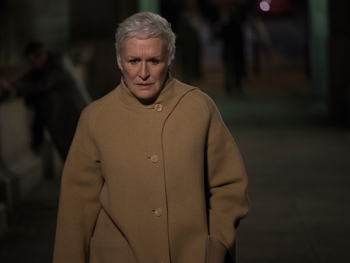
Behind any great man, there's always a greater woman
Cast: Max Irons, Christian Slater, Glenn Close
Director: Björn Runge
Genre: Drama
Rated: MA
Running Time: 100 minutes
Synopsis: Behind any great man, there's always a greater woman. Joan Castleman (Glenn Close) has spent forty years sacrificing her own talent, dreams and ambition to support her charismatic, philandering husband Joe (Jonathan Pryce) and his brilliant literary career. Their faithful pact reaches breaking point on the eve of his being awarded the Nobel Prize for Literature. The Wife is an emotional journey of self-discovery and liberation.
The Wife
Release Date: August 2nd, 2018
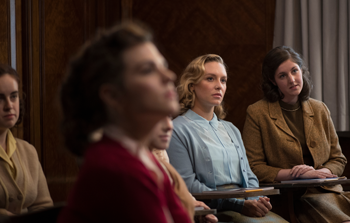 About The Production
About The Production
Behind any great man, there's always a greater woman … and you're about to meet her. It is crucial you get to know this woman – many of us already do and don't even realise it.
Joan Castleman (Glenn Close): a highly intelligent and still-striking beauty " the perfect devoted wife. Forty years spent sacrificing her own talent, dreams and ambitions to fan the flames of her charismatic husband Joe (Jonathan Pryce) and his skyrocketing literary career; Ignoring his infidelities and excuses because of his "art" with grace and humour.
Their fateful pact has built a marriage upon uneven compromises. And Joan's reached her breaking point. On the eve of Joe's Nobel Prize for Literature, the crown jewel in a spectacular body of work, Joan's coup de grace is to confront the biggest sacrifice of her life and secret of his career.
The Wife is a poignant, funny and emotional journey; a celebration of womanhood, self-discovery and liberation.
Directed by Berlin Silver Bear-winner, Björn Runge, The Wife is adapted by Jane Anderson from the Meg Wolitzer novel of the same name. The film co-stars Christian Slater, Max Irons, Harry Lloyd and Annie Starke.
Silver Reel's Claudia Bluemhuber, Meta Film's Meta Louise Foldager Sørensen, Rosalie Swedlin for Anonymous Content, Piers Tempest and Jo Bamford for Tempo Productions are the film's producers. Spark Film & TV's Piodor Gustafsson co-produces.
The Wife received its World Premiere at the Toronto International Film Festival in September 2017.
A Quote From The Director
"For me, this film is like music; two instruments that play for us. The way that Glenn Close and Jonathan Pryce act reminds me of music - like two solo instruments playing together. Whilst editing, it was impossible for me to detach the story from their acting. They had the ability to incorporate the script into their acting, in a way that was deeply fascinating. It's not just a plot-driven story. My ambition as a director is to find ways to let the actors be free. In the end, it's all about finding the music of the script, to let it swing. In the best-case scenario, the audience will share that swing during the golden moments in the film."
BJÖRN RUNGE, Director of The Wife
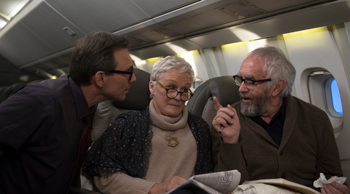 A Marriage, A Talent, A Secret: Bringing An Acclaimed Novel To The Big Screen
A Marriage, A Talent, A Secret: Bringing An Acclaimed Novel To The Big Screen
A compelling tale of love, marriage and intimate secrets unfolds in the critically acclaimed The Wife, from top Swedish filmmaker Björn Runge. The story of a long-term marriage built on passion, ambition and a huge compromise which comes crashing down many years later, the film is a tender and complex examination of late-life relationships, and a fascinating observation of human nature in its many guises.
The Wife features terrific performances from Glenn Close and Jonathan Pryce, who are aided and abetted by a universally strong, international cast. Told partly in the present-day 1990s and in flashback to the early days of their relationship in the 1950s and 60s, this sweeping yet personal drama is adapted from the much-loved novel by Meg Wolitzer.
For screenwriter Jane Anderson, (How to Make an American Quilt, Olive Kitteridge) the film offered an opportunity to tell a story of marriage and hunger to succeed from a very unique and lesschartered perspective.
"Way back in 2003, Meg Wolitzer's incredible novel called The Wife came out, and I read it, and I was blown away. What Meg does, she tells a story that is so subversive about what it is to be a female writer. It's the point of view of what it's like to be The Wife of a great literary giant. And secretly she's the one who knows that she has the true talent," explains Anderson.
Still, Anderson felt that the story needed some adjustments to make the transition from page to screen smoothly. "When you adapt a piece of literature to film, you have to make a couple of adjustments to make the narrative more dramatic, more exciting, more sparkly. In the novel the prize that the great Joe Castleman gets is an obscure prize in Helsinki, Finland. I chose to make it take place where the Nobel Prize is, because that ups the stakes. I also added into the dramatic narrative of the rather damaged adult son of Joe and Joan Castleman."
For Anderson, the casting of Glenn Close was a huge coup for the production, and added a sense of grace and levity to the characterisation of a very interesting woman. "The character of Joan Castleman is a deeply contained, elegant and shy woman who has taken the back seat to her brilliant husband," she said. "Who better to play that kind of role and to give it all the texture and all the subtext that you need than someone like Glenn Close, who is just very naturally an elegant, wickedly smart actress?"
She is hopeful that the film will invoke debate about marriage, the secrets you keep and the compromises you make. "When I write a film, I always ask myself: 'What is the audience going to talk about when the lights come up and they all walk out together?' And I think what they're going to talk about is: What are the compromises that we make in a marriage, in a great partnership? Are there secrets that we keep as a couple that are legitimate? Are there compromises that you make as a woman in a marriage? As a husband, how do you respect and love your wife?"
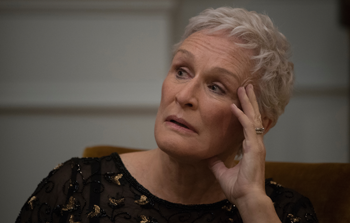 Secrets And Lies: Getting To The Heart Of The Wife's Complex Characters
Secrets And Lies: Getting To The Heart Of The Wife's Complex Characters
In order to let the story of this couple be woven in all its subtlety, complexity and dark humour, the production needed an instinctive, wise filmmaker, and a director known to work particularly well with actors. Björn Runge, whose ability to bring unique perspective to his films such as Mouth To Mouth and Silver Bear-winner Daybreak, proved to be an inspired choice.
According to producer Piers Tempest, he had an understanding of the tone the project was striving to achieve from the earliest stages. "Björn describes the film really well, as an elastic band which stretches throughout the movie, and in the end, it breaks, when this big secret comes out, and the impact it has on Joe and Joan's family," he said. "It's a fantastically gripping piece of cinema, which we're all very proud of."
The director was keen to get on board from the very early stages and remained attached to the project during the invariably protracted development period. Producer Rosalie Swedlin takes up the story:
"When Jane, who I met many, many years ago because we developed another project together, came back into my life, The Wife is what I read, and it bothered me that the movie hadn't gotten made," she explained. "I had one of those weekends where you start thinking: 'How am I going to do this?' It suddenly struck me that because the film was largely set in Stockholm where the Nobel Prize is awarded, that maybe I could partner with a Scandinavian producer."
Within a short period, producer Meta Louise Foldager Sørensen boarded the project, after reading the script.
"I absolutely loved it and I knew I just had to do this! I thought that this was perfect for a Scandinavian co-production because it's set in Stockholm. So I brought on board a Swedish director: we chose to work with Björn Runge. He's a great director, an actor's director. He has also worked a lot in theatre, so I thought he had the right sensitivity for this project."
"He became our director and he just got the script," continues Swedlin. "He loved it, he was passionate about it, he wrote these wonderful emails. What we adored was he said: 'This is a movie for everybody'. He didn't think of it as a high-end speciality movie, he saw all the themes."
"One would think that you would need a female director to bring out all of the subtleties of that (story)," said Anderson of the film's sensibilities. "Björn Runge, I recall, is the most feminist of male directors! He has a beautiful, sensitive sensibility and he absolutely understands what the script is trying to say."
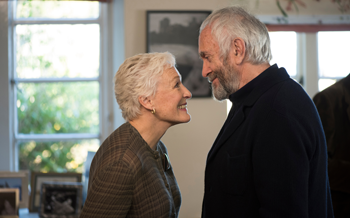 Unravelling The Wife: The Director's Role
Unravelling The Wife: The Director's Role
Long acclaimed as 'an actor's director', Björn Runge's innate ability to allow a story to breathe, and draw the very best out of his cast, along with the script, was what drew many of cinema's most acclaimed actors to the project. His much-admired work in theatre proved to be an asset in this regard, too. For Runge, one of the big draws of the story was the intense relationships between the various characters within the film.
"There was a play between a mother and a father and a son. It was something I was familiar with in my earlier work in theatre and on shoots in Sweden. But what I was really attracted to was that it was set up on a Nobel Prize winner's stage. It was a small story within a larger story.
"I think the biggest difference from the novel to the script is that Jane has given the son, David, a more important position in the script."
When it came to assembling his cast, the director jokes that: "Glenn Close cast me, actually, and then I cast the rest".
Indeed, the six-time Academy Award-nominated actress, who has had a stellar career spanning four decades, was a fan of both the director and writer. "I've been an admirer of Jane Anderson's writing for many years. When I heard it was Jane and then I read the novel I thought it was a really, really intriguing premise," she said.
Of Runge, she added: "I love the way he works. I think it's a kind of a perfect melding of his theatre and film knowledge. He has a wonderful understanding of the acting process, and gives you time, especially if it's a difficult scene. The way he sets up shots gives you time, and the wonderful way he covers things. I feel like we've almost been a little theatre company on this movie."
For the director, the ability of his leading lady to work instinctively greatly enhanced the experience of working with her. "She's got an extremely good sense for acting in front of the camera, but she also has an extremely good sense of where the character is in the script," he said. "She's in the character in a way that I have never experienced. She knows what the character should give the audience, what kind of emotions."
In finding a male lead for the film, the production needed an actor that would bring a believability and levity to the role of Joe Castleman, and work with Close in unravelling this marriage in all its complexities. Renowned British actor Jonathan Pryce proved to be an inspired choice.
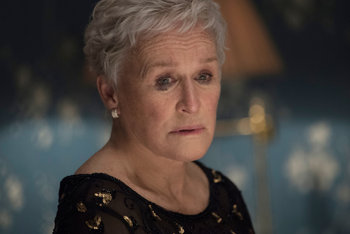 "Part of my attraction to the script was knowing that Björn was going to be directing it," says Pryce of the film. "I liked his work and I liked the fact that it was a film about relationships. I was looking forward to making it because of the fact that it has this Swedish or Nordic slant."
"Part of my attraction to the script was knowing that Björn was going to be directing it," says Pryce of the film. "I liked his work and I liked the fact that it was a film about relationships. I was looking forward to making it because of the fact that it has this Swedish or Nordic slant."
For his part, the actor brought a naturalistic approach which the director was impressed by. "In one scene, when he wakes up you can see in his eyes he's had a strange dream. I didn't ask for that but he has given us that. It was so fantastic to work with both Glenn and Jonathan. They are a perfect couple. They are in a way made as actors to work together. Logical, small details are a starting point for their acting, and then, as soon as they know exactly how the details look in the room for them, they can go into the deep emotions of the scene. To go in for a meeting as two souls that are wrestling with their destiny. And that's what this film is about."
Pryce agrees that he and Close developed a strong working relationship during filming, and the results are evident onscreen. "I've always liked her as an actor. We're both the same age, and we can both draw on very similar life experiences. There's not a lot that has to be said between us, which again I like very much. We both understand the needs of the characters and the film. It's really good to work with someone who's that dedicated to their work and that intense about their work." "It's been wonderful, working with Jonathan," adds Close. "I remember him in Brazil, all those years ago, and I've never forgotten him in that performance. He's just one of the greats of his generation, so it's a huge thrill and an honour to be working with him."
While the interactions between Joan and Joe are at the heart and core of the film, it was vital for the production to cast key supporting characters to fully flesh out the story. "When I was searching for actors to cast as the David character, their son, I was really searching for someone who was fragile, and vulnerable, but also who could have a kind of hard side," explained Runge.
"Joe is a little bit afraid for his son, David, and for me it was important to find someone, an actor, with that combination of different emotions. The poetic side and the brutal side. And for me Max Irons is right there."
Irons, for his part, enjoyed a strong collaborative relationship with the director. "He's so precise. He's so relaxed. He talks in a language that we all understand. We finished early every day, which is unheard of! He's economical with the way he shoots and the way he directs, and he's got so much heart. Such a good emotional intelligence, which is precisely what you need for a film like this."
Top US actor Christian Slater plays dogged reporter Nathaniel Bone, who senses all is not as it seems in the successful narrative of the Castleman's marriage, and sets about finding out the real story. It leads to some of the film's most humorous scenes.
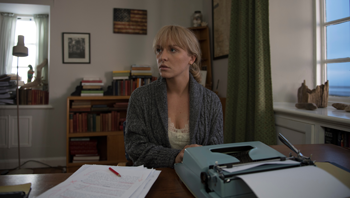 "I've been in this business 40 years now believe it or not," said Close. "And the more I continue to do it, the more I realise it's about an actor's ability to play, and to move around within a scene, especially in film. To be able to try all kinds of different things, and give the editor as much material for the editing room. Christian and I had these three scenes, where basically he's interviewing me in a pub. And we had a lot of fun. I'd never met him, and it was great play " we were able to try a lot of different things."
"I've been in this business 40 years now believe it or not," said Close. "And the more I continue to do it, the more I realise it's about an actor's ability to play, and to move around within a scene, especially in film. To be able to try all kinds of different things, and give the editor as much material for the editing room. Christian and I had these three scenes, where basically he's interviewing me in a pub. And we had a lot of fun. I'd never met him, and it was great play " we were able to try a lot of different things."
"We play sort of an interesting chess game, metaphorically, and it's a very cat and mouse kind of situation between the two of us," added Slater. "I'm trying to get her to tell me the truth and she keeps me at bay. It's definitely a nice push and pull sort of relationship."
Because the film is set in two different time periods, the production needed two strong actors to successfully realise the hopes, ambitions and dynamics of the younger Castlemans' marriage, helping the audience come to know them and their story and setting the foundation for the revelations that come. Their early days of marriage emerge intriguingly through the performances of Annie Starke and Harry Lloyd.
"I came to The Wife for several reasons. I am a huge fan of Jane Anderson, have been for quite some time, and I also really love Björn and his work," said Starke. "It was such a beautifully written script about marriage and a really interesting relationship between two people."
Harry Lloyd embraced the opportunity to play a younger Joe with all his nuances. "There were lots of similarities, but we talked a lot about the differences as well, and Björn said something at the beginning which was really interesting, which was: 'In a way the older Joe is more of a baby than the younger Joe'."
"I think it's a really interesting perspective on a relationship between two people that are very complicated and complex themselves," adds Starke. "But their powerful love for each other not only creates beautiful stories but, I think, truly affects their lives in ways you can't even imagine. It's just a really interesting perspective on two people's relationships."
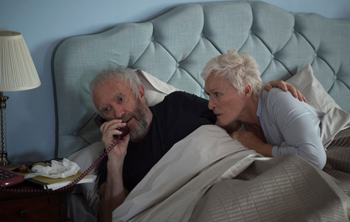 Past, Present And Perspective: Setting The World Of The Castleman Relationship
Past, Present And Perspective: Setting The World Of The Castleman Relationship
While set in the US and Stockholm, most of the production of The Wife actually took place in and around the Scottish city of Glasgow, which has proven to be a highly successful location for a number of recent productions.
"It's the fourth film we have done in Glasgow", says producer Claudia Bluemhuber. "We have done Under The Skin there, The Railway Man, and two films this year, Churchill and The Wife. Our experience there is really, really good. The crews, the support we get, we really love it there. It was good to shoot it for Connecticut, it really worked."
"When one is shooting these movies, you look for where can yield the best production values," adds producer Piers Tempest, "and actually Glasgow has it all. It has two massive venues which double for the Nobel Prize ceremony venues, and it's got a Concorde, which is great, because the film is set in the mid-nineties and Concorde was obviously iconically within that time period."
"Scotland in autumn 2016 will forever be a great memory for me," said Runge. "In one way, I felt it was a second home. It has been absolutely marvellous, not only because of the crew, the very fine locations, but also the circumstances around this production have been, for me, amazing."
In terms of the look and feel of the film, shooting for other locations was not the only "exciting challenge" according to production designer Mark Leese - shooting time periods authentically was another vital element of the production. The story unfolds in various timelines, often in flashback, and in three different iconic cities, making for a busy production.
"What's interesting about it is, there are no locations within the script that are actually in the UK or Scotland, but we are filmed the bulk of the project in and around Glasgow," he said. "That's been an exciting challenge to be honest. We've had to recreate New York in the 1950s, Connecticut in the 1990s and the 1960s, and Stockholm in the 1990s.
"I think one of the challenges was trying to recreate the Nobel ceremonies and banquet, which are massive and expensive in the real world, with a budget and with time constraints. How do we recreate that? I think we've done really well, but it was an exciting challenge, something to get our teeth into.
"It's about authenticity. You have a puzzle to solve and it's about how much you're influenced by reality and the recreation of a period, and how much you look at it, explore it, and then make it your own. At times we've tried to absolutely replicate certain things, and other times we've just taken it as a guide, then we've gone off and done what we want."
The costumes in the film look exquisite but real too, and like the production design, costume designer Trisha Biggar aspired to bring out a sense of authenticity. "One of the challenges there are when working on a period film is doing the research," she said.
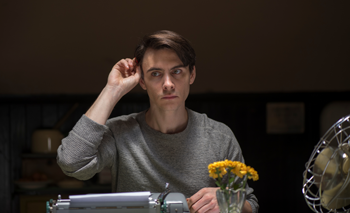 "That's always really interesting and this has been particularly interesting because I was researching more than one country. It's very often the case that you find what was being worn in America or what was being worn in Britain is not the same as what was being worn in Stockholm in the 1990s. Also, American clothes in the 50s were very different from British clothes in the 50s.
"That's always really interesting and this has been particularly interesting because I was researching more than one country. It's very often the case that you find what was being worn in America or what was being worn in Britain is not the same as what was being worn in Stockholm in the 1990s. Also, American clothes in the 50s were very different from British clothes in the 50s.
"It's always challenging to capture the essence of the period, perhaps without being fully authentic about the period, because a contemporary eye doesn't find the early 1990s as attractive as we all thought it was in the early 1990s!"
Likewise, different times and cities meant creating very different styles to complement and specify the places and periods, according to Charlotte Hayward, hair and make-up designer. "Probably one of the most challenging bits was trying to marry in the 1950s section with the younger characters. So finding their looks and making sure we believe they're the people that we see later. We had to be certain of what we were doing, that we were jumping through the periods correctly and getting the right looks."
Producer Piers Tempest hopes the film, with such a complex relationship at its core, will connect with audiences deeply. "It's a very real relationship, people will feel very within that relationship, hopefully it will resonate and people will find strands and character traits that they will relate to and just be really submerged into a story. I think that's the best use of cinema when you completely know the character," he says.
"I think it will be a very emotional film," adds the director. "I think it will be a film with a big heart, and I think it will be a film where you can smell the changing of people trying to find their way in their lives, and that's for me a sort of miracle, when you see actors that in a way, show you as an audience their heart."
Release Date: August 2nd, 2018
MORE
- Mission: Impossible Fallout
- Glenn Close The Wife
- Allison Chhorn Stanley's Mouth Interview
- Benicio Del Toro Sicario: Day of the Soldado
- Dame Judi Dench Tea With The Dames
- Sandra Bullock Ocean's 8
- Chris Pratt Jurassic World: Fallen Kingdom
- Claudia Sangiorgi Dalimore and Michelle Grace...
- Rachel McAdams Disobedience Interview
- Sebastián Lelio and Alessandro Nivola...
- Perri Cummings Trench Interview



